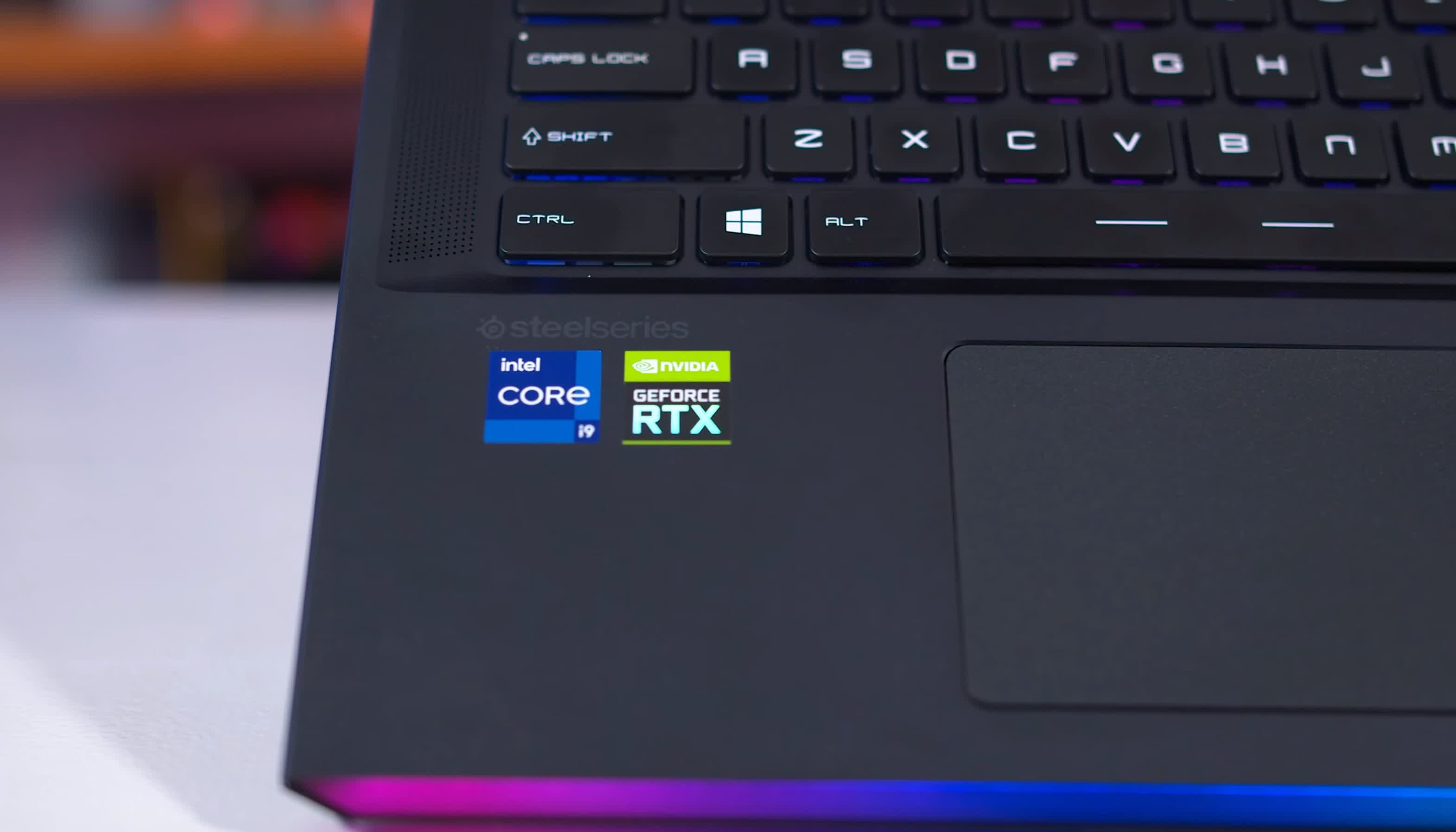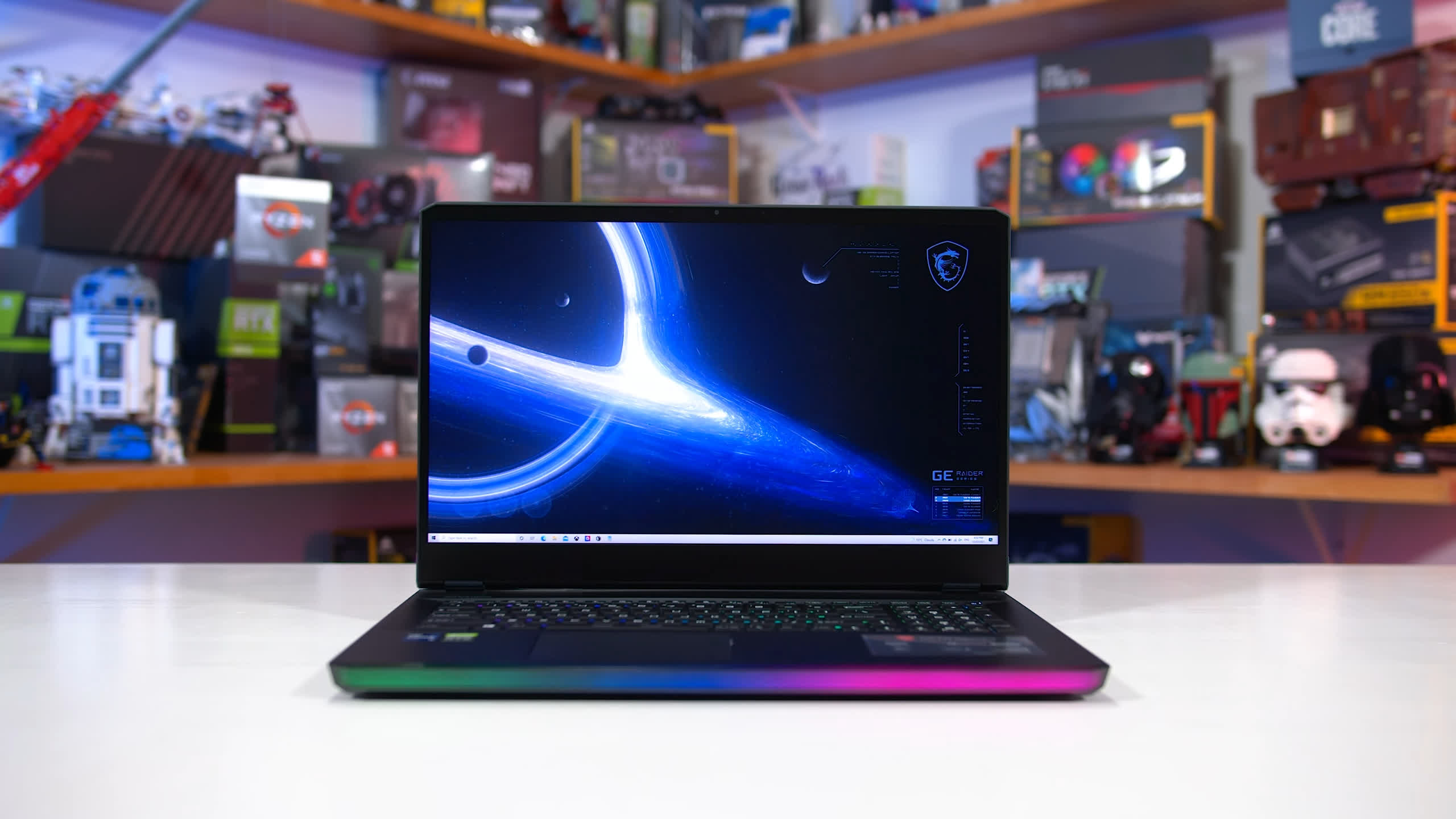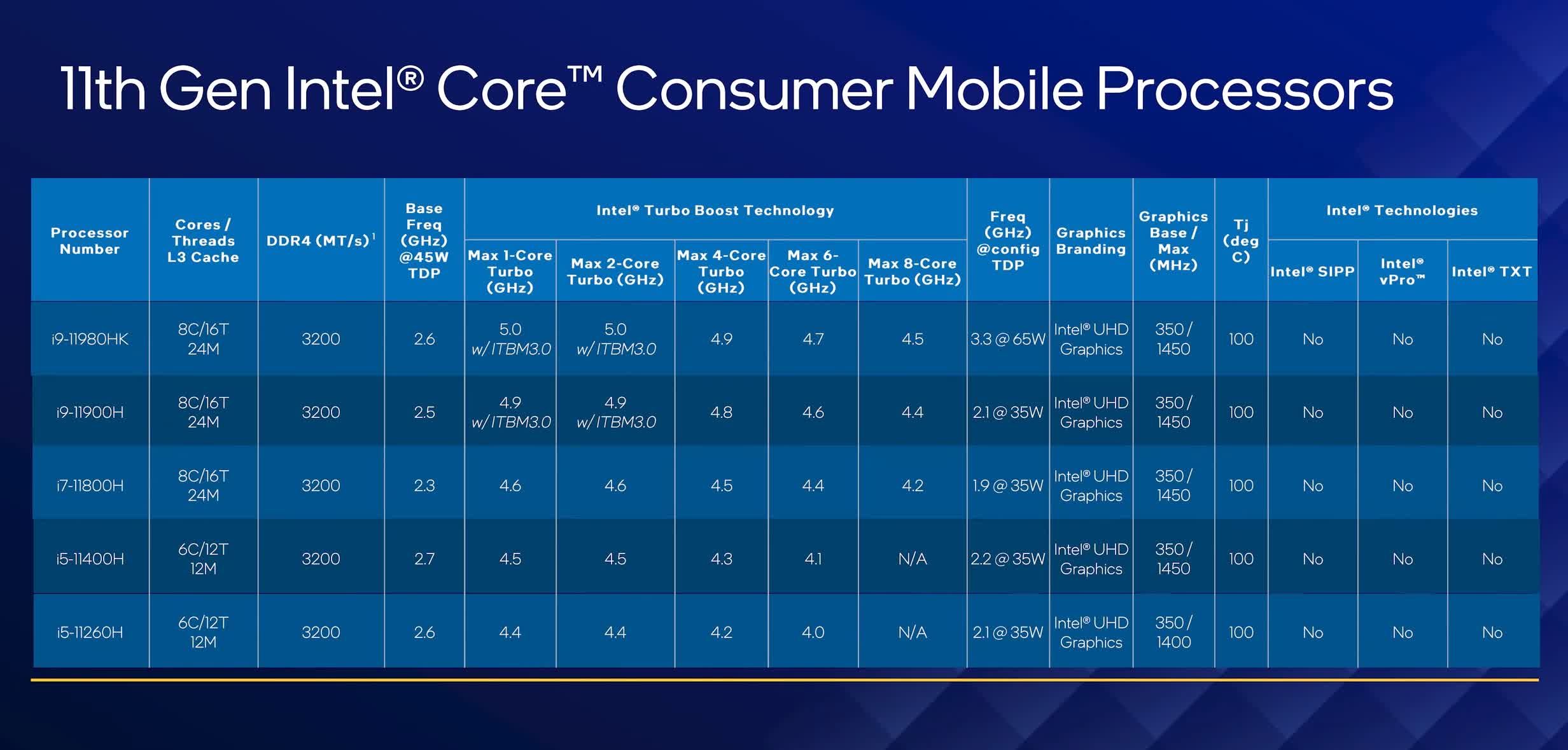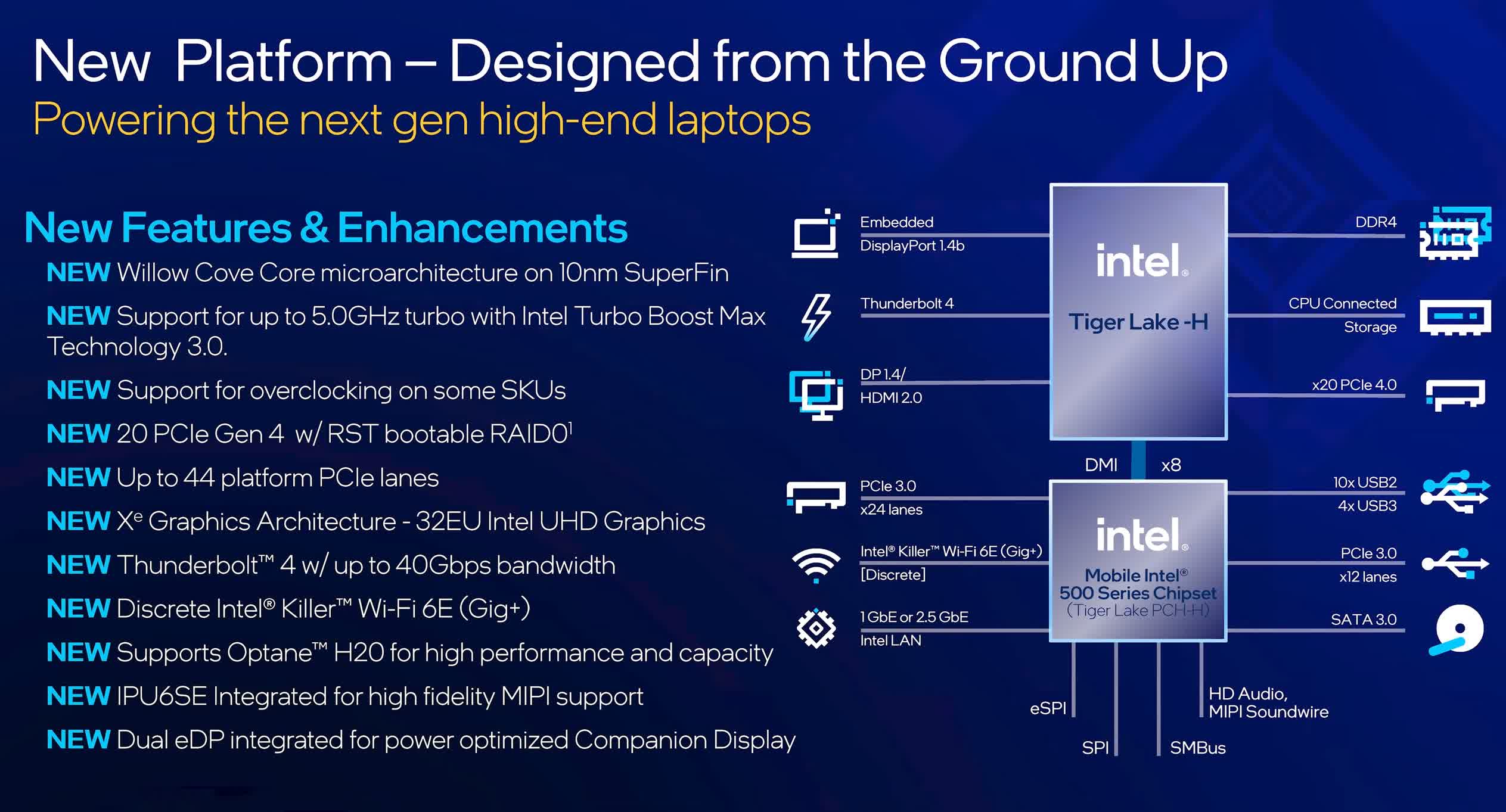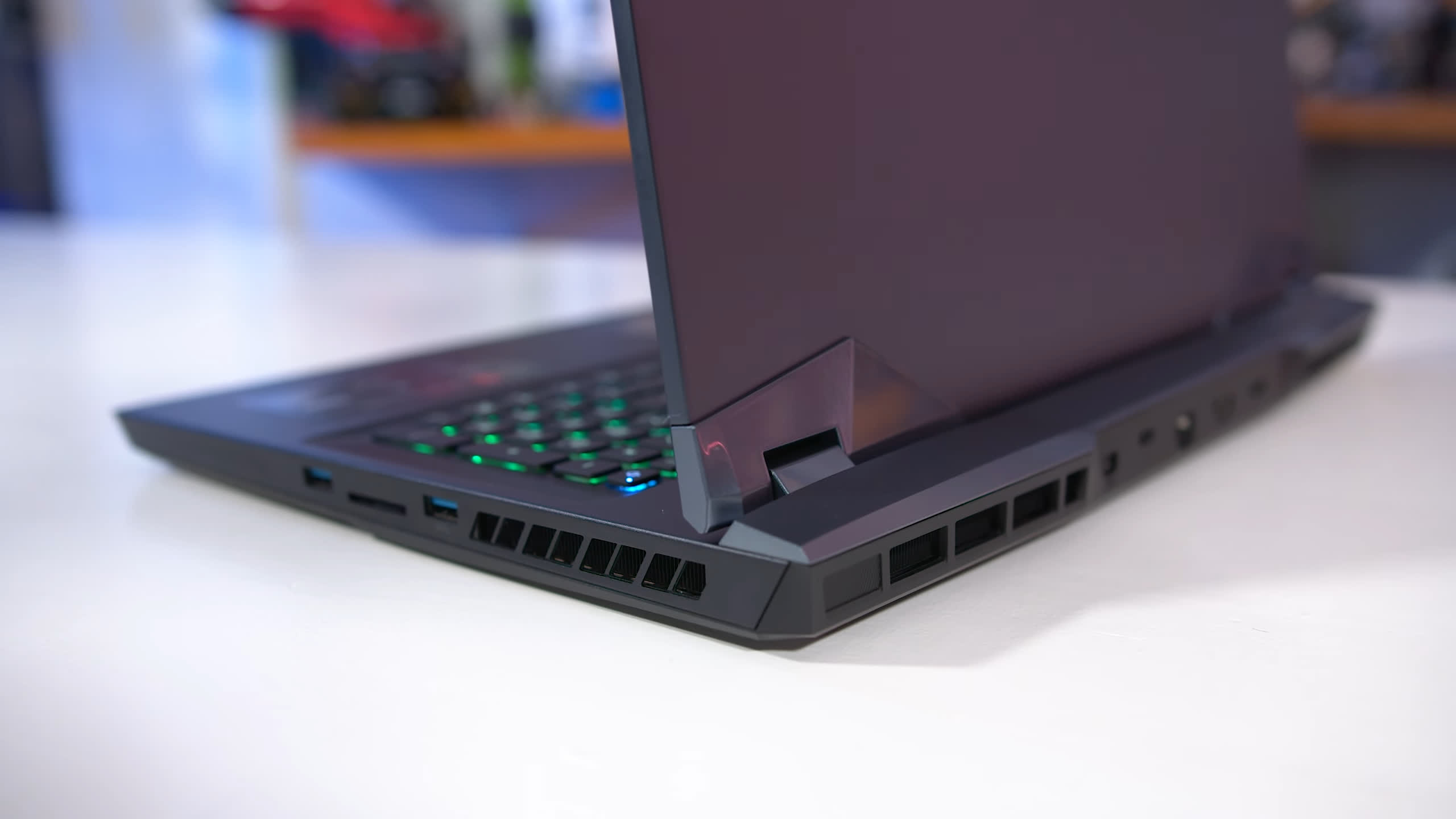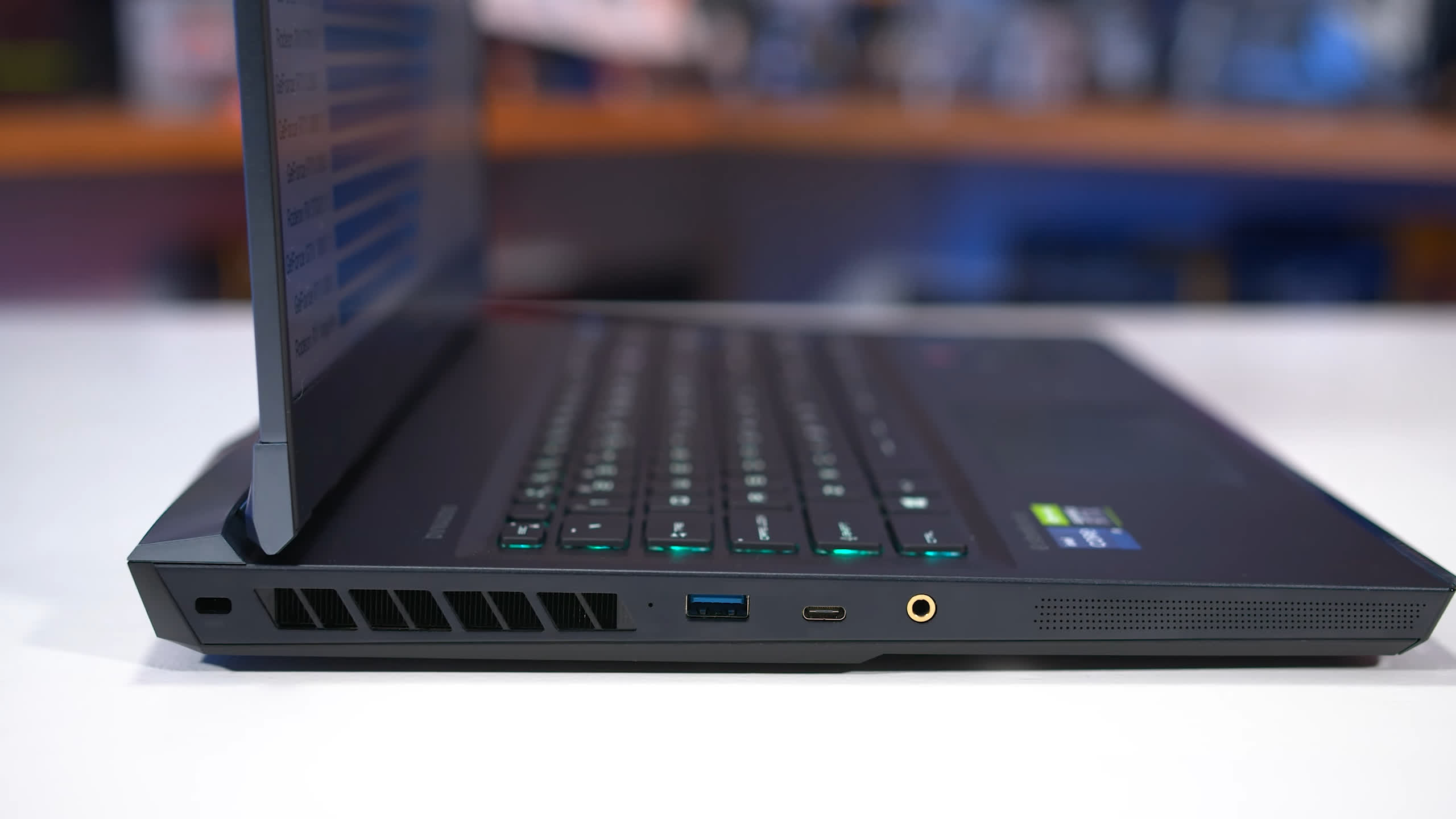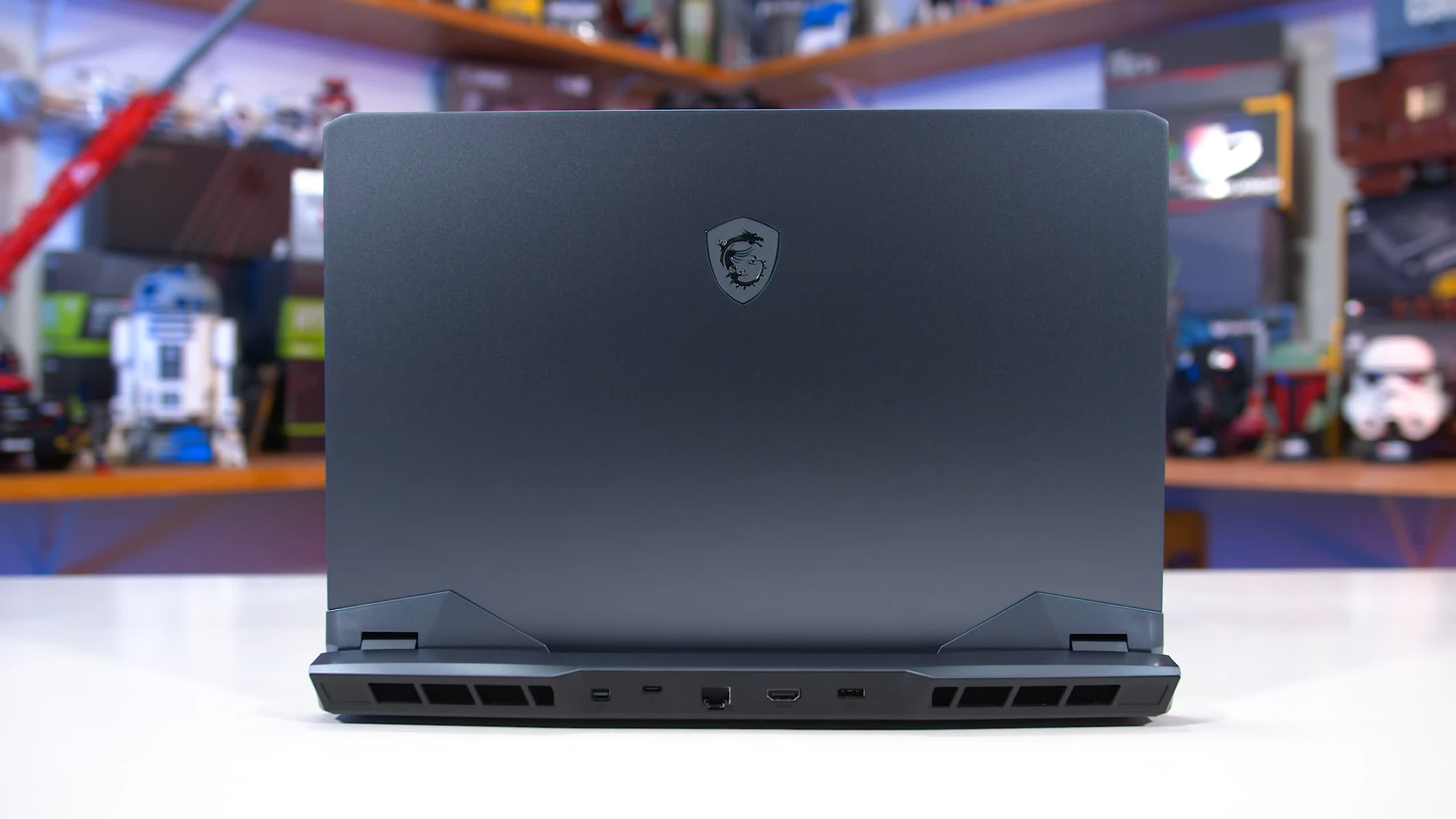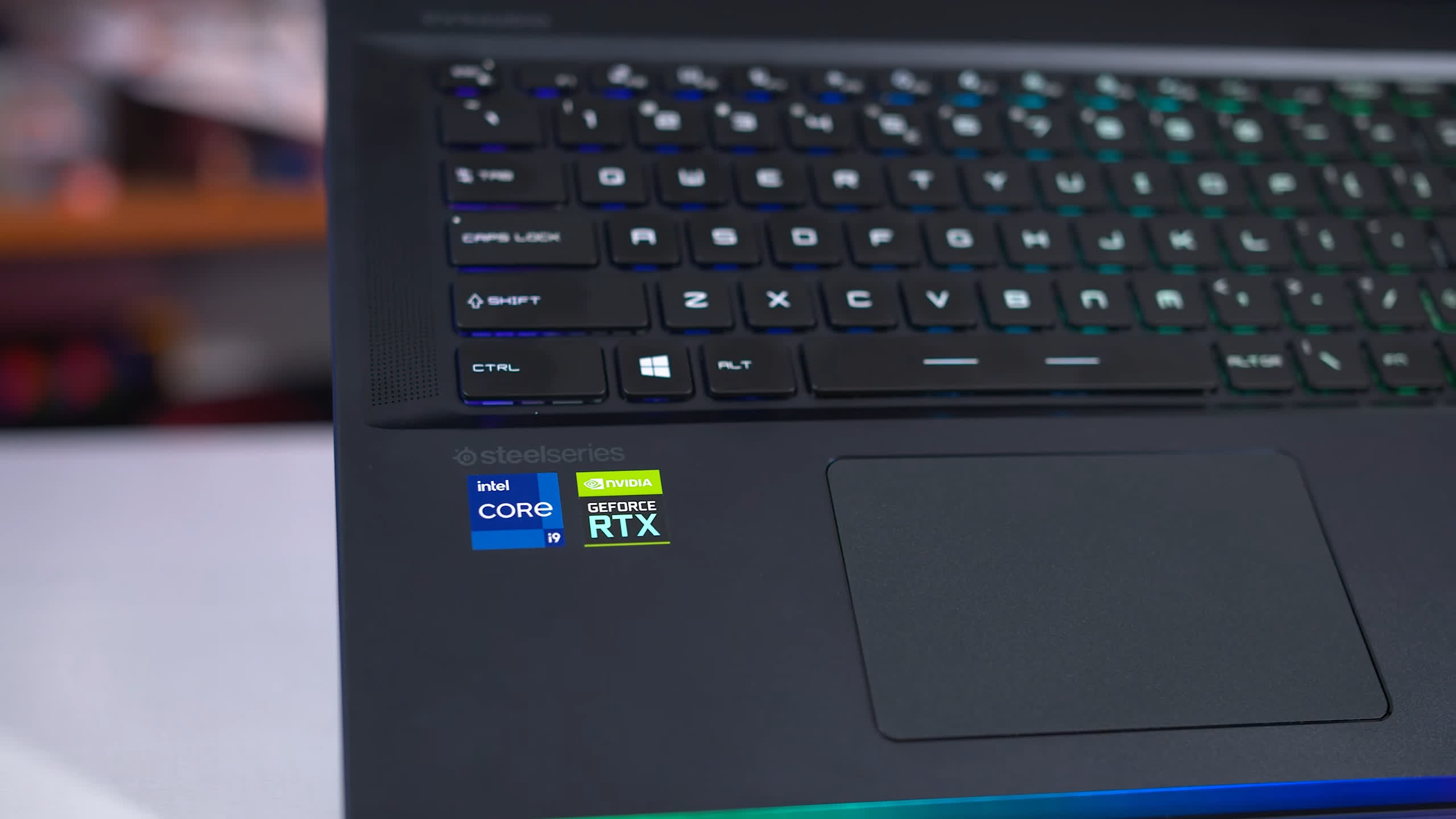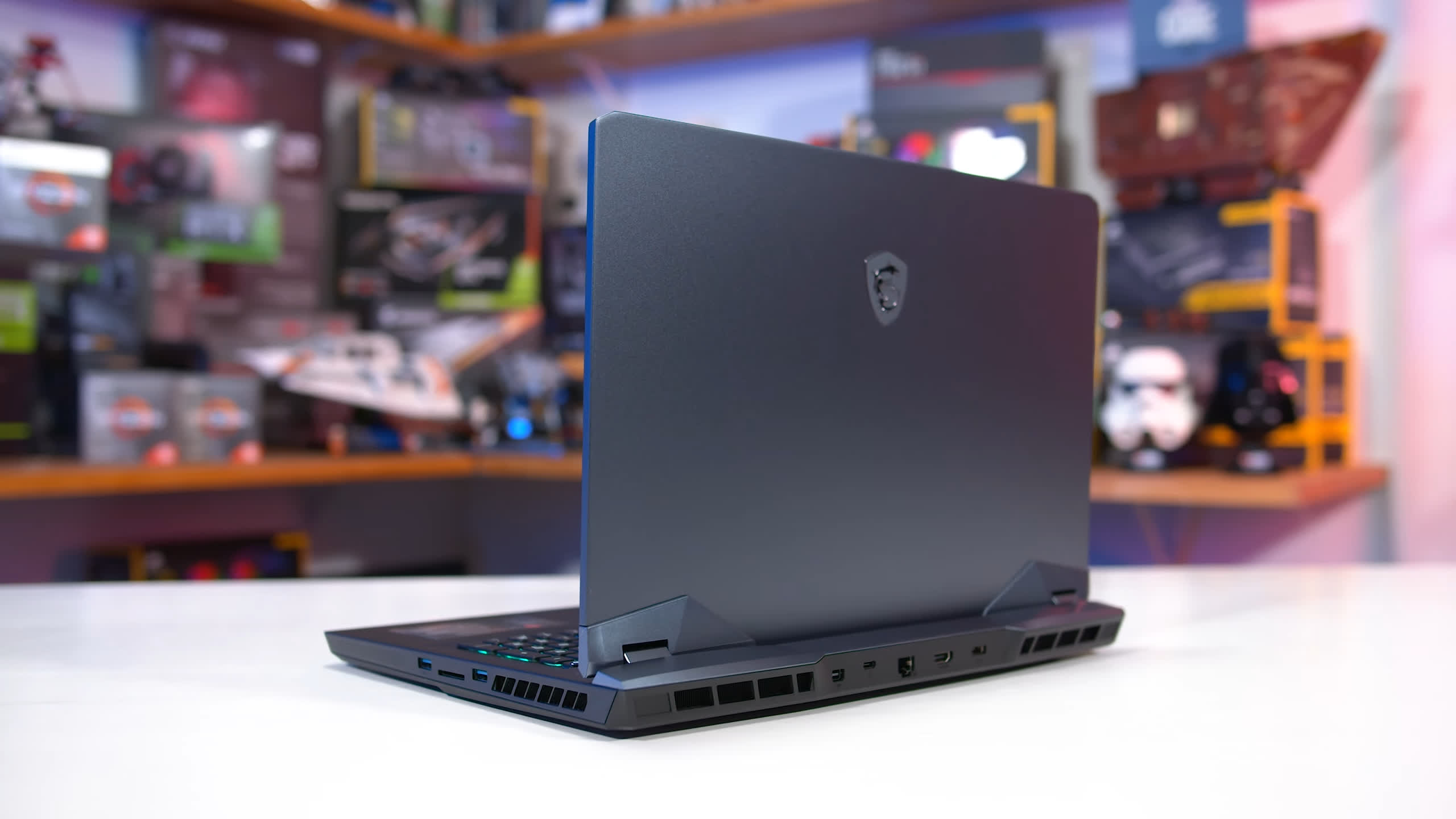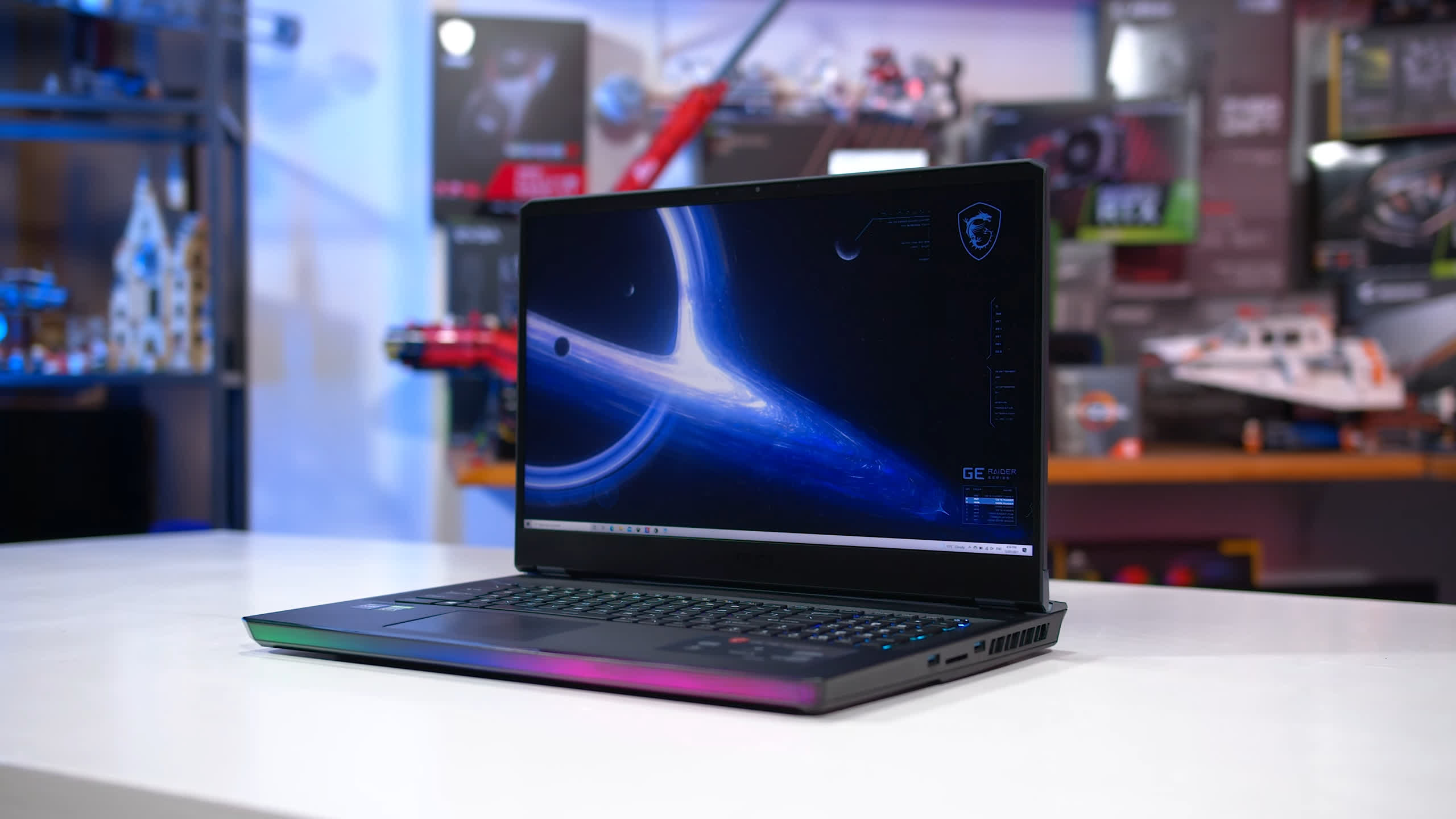Today we're taking a look at the Core i9-11980HK, the fastest processor Intel offers in their Tiger Lake H45 line-up. A few weeks back we tested the new Core i7-11800H which did impress with performance gains over Intel's previous-gen parts, however we ultimately ended up with mixed feelings.
The i7-11800H couldn't outperform AMD's equivalent Ryzen 5000 parts in the majority of productivity applications, and the generally higher pricing of the Intel platform weakened its advantage in gaming where Intel does well.
The Core i9-11980HK is the top processor in Intel's mobile stack, so we want to find out how it performs when compared against a Ryzen 9 mobile chip or Intel's own Core i7-11800H which is a more mainstream offering usually available in the same systems. How much has Intel been able to eek out of their best Tiger Lake 8-core silicon?
In this review we'll put particular focus on this comparison between the 11980HK and 11800H. Both CPUs are very close in their fundamental design and specifications. Both are 8-core chips with 16 threads and 24 MB of L3 cache. Both have the same Intel Xe integrated graphics. The major difference is in clock speeds: the 11800H has a base frequency of 2.3 GHz and a maximum turbo clock of 4.6 GHz, the 11980HK has a base of 2.6 GHz and a maximum turbo clock that hits 5.0 GHz, provided CPU cooling is adequate. This gives the Core i9 model a clock speed advantage of roughly 10 percent.
The other advantage the 11980HK has is on the platform side. Although most specs are identical across Tiger Lake H45 processors: 20 lanes of PCIe 4.0 attached to the CPU, Thunderbolt 4 support, DDR4-3200, 10nm SuperFin process node – but being an HK model, the 11980HK also supports overclocking.
While all Intel H-series processors allow to configure any power limit (including above the standard 45W even on locked parts), only the 11980HK actually allows you to modify the clock multiplier table and several other values in Intel XTU or other utilities. Typically though, this is only relevant for the beefiest laptops as power and thermal limits are going to be significant for most designs.
The test system for today's benchmarking is the MSI GE76 Raider, a similar laptop belonging to the same product family that we looked at when testing the Core i9-10980HK.
Inside this laptop is the GeForce RTX 3080 Laptop GPU with 16GB of VRAM and a 135-155W power limit, and for our testing we are using 16GB of good quality dual channel DDR4-3200 memory, standardized across all H-series laptops we've tested.
This is a nice notebook, powering a 17-inch 1440p 165Hz display, which really suits the GPU as this sort of hardware has moved beyond 1080p resolutions in modern games. It's not the slimmest or lightest model, but it's not meant to be. This is a performance-focused laptop that's still relatively portable, has a nice metal build quality, though I could take or leave the RGB light bar along the front edge.
However this isn't a laptop review, this is a review of the Core 9-11980HK, so like all our previous laptop tests we have benchmarked this system power normalized. What this means is we keep all boost behavior stock, but utilize a long term power limit of 45W, the default for these processors.
This gives us the ability to make apples-to-apples comparisons across different laptops, ignoring any OEM configurations or potential cooling/power differences between models. As a result, it's a true test of the CPU's capabilities in comparison to others, not just a test of how well a specific OEM can configure their system to use the most power.
We will include some power scaling data later in the review, too, so you can see how various chips perform at different power levels, which may be useful for your buying decision. On to the benchmarks!
Benchmarks
First up is Cinebench R23. In this workload, the 11980HK performs reasonably well, offering a 7 percent performance uplift over the Core i7-11800H. This makes the 11980HK more competitive with Ryzen, matching the performance of the Ryzen 7 5800H and falling behind the Ryzen 9 5900HX by 9 percent when looking at the same power configuration.
The margin is down to just single digits though, and we see a substantial 28 percent performance uplift over the Core i9-10980HK from the previous generation in this heavy multi-threaded workload, a good sign for the efficiency improvements Intel have made here.

The single-thread performance results in Cinebench R23 are strong for Intel, with some caveats.
The 11980HK is marginally faster than the Ryzen 9 5900HX in this test, I recorded a 3 percent performance difference which is close to the margin of error, but it is faster. It's also slightly faster than the Core i7-11800H, and 17 percent ahead of the 10980HK.

The gains seen here between the 11980HK and 11800H aren't as high as the differences in rated clock speeds would suggest. With the 11980HK being a 5.0 GHz part, and the 11800H coming in at 4.6 GHz, the Core i9 part should be around 8-9 percent faster, but here it's only 3 percent faster. Why is that?
Well, that's because the 11980HK rarely runs at its full 5.0 GHz clock speed, it can do so in very short bursts, but it's rare to see sustained performance sit at that clock speed. Cinebench R23 single thread takes multiple minutes to run, so for most of that run the 11980HK sits at a lower clock speed.

In our long Handbrake CPU encoding test, the 11980HK is slightly faster than the 11800H: 4% to be exact. This is large enough to be outside the margin of error but isn't a mind boggling difference between the 8-core parts and clearly over a sustained period the Core i9 processor is only slightly more efficient.
In the end, the Intel part ends up 15 percent behind the Ryzen 9 5900HX, and 15 percent ahead of their previous generation model, the 10980HK.

We see similar results in the Blender Classroom workload. Here the 11980HK is 8 percent faster than the 11800H, but 14 percent slower than the Ryzen 9 5900HX. It's in these sorts of heavy multi-threaded workloads that take multiple minutes to complete that the Ryzen processor has an efficiency advantage at 45W, and therefore a performance advantage as well.

In Chromium code compilation which is another long term, heavily multithreaded workload, the 11980HK performs well: 6% faster than the 11800H, which allows it to sit basically neck and neck with the 5900HX from AMD. With a 20 percent lead over the 10980HK, there are plenty of reasons to upgrade to a new model laptop from Intel's direct prior generation, the gains here are quite large for a laptop form factor.

As we move into shorter tests, Intel's Tiger Lake H45 is clearly the way to go for Matlab this generation.
With a larger amount of L3 cache than AMD's equivalents, at 24 MB vs 16 MB, the 11980HK outperforms the 5900HX by 10 percent in this workload. Combined with great single thread performance, Intel does well in these sorts of tests.

Similar story in our Microsoft Excel number crunching test. This was one of the largest margins between the Core i9-11980HK and Core i7-11800H at around 19 percent, which appears to be a byproduct of higher clock speeds at a given power level, and the ability for this MSI laptop to boost in terms of power.
The result is 20 percent higher performance than AMD's Ryzen 9 5900HX in this workload.

For general everyday workloads as measured in PCMark 10's essentials test, there is no difference between Tiger Lake H45 and AMD's Ryzen 5000 line-up. So if you're just interested in basic app loading, web browsing, video conferencing and such, either current generation part will suit you well.

We see similar results in PCMark 10's Applications workload. There isn't much separating the Ryzen 9 5900HX and Core i9-11980HK, which makes sense given what we've seen in previous tests comparing lightly threaded performance.

In 7-Zip compression the clear winner is the Core i9-11980HK. The Core i9 part performs strong with a 14 percent performance advantage over the Ryzen 9 5900HX – AMD's current generation parts are more in line with Intel's 10th-generation in this workload.

However that flips when looking at decompression. Now the 11980HK is 15 percent slower than the Ryzen 9 5900HX, and only a few percent ahead of the i7-11800H. AMD processors are very strong performers at decompression workloads and have been for some time now.

In Adobe Photoshop using the Puget Systems benchmark, the Core i9-11980HK performs well, slightly outperforming the Ryzen 9 5900HX, though realistically both systems provide a similar level of performance.
While the 11980HK is a decent 10 percent faster than the 11800H, matching the difference in clock speeds, the 11980HK isn't that much faster than the 10980HK. I believe a lot of that is down to this workload preferring frequency, where the 10th-gen Core i9 part actually has a small advantage over 11th-gen in lightly threaded apps like this.

In DaVinci Resolve Studio 17 it's always a little tricky to compare across different laptops as the GPU has a significant influence here. But what we can see is that with the same RTX 3080 Laptop GPU, the new 11980HK model does deliver better performance than the 10980HK, delivering a 13 percent higher score. There is a GPU difference, but overall it seems Intel and AMD are very competitive in these sorts of workloads this generation.

Very similar result in the Adobe Premiere Export test from Puget Systems. 15% better performance comparing the 11980HK to the 10980HK allows the Intel system to perform well and competitively with the Ryzen 9 5900HX, again noting the difference in GPUs, meaning we can only talk generally about performance.

And finally we've got Adobe After Effects. The combination of the 11980HK and RTX 3080 Laptop GPU is very powerful in this workload and delivers strong performance, beating most of the other systems we've tested and delivering substantially higher results than the 10980HK.
Power Scaling
Power scaling data shows how the Core i9-11980HK compares to other CPUs at a variety of power levels. We were only able to push the MSI GE76 Raider up to around 75W sustained, as the cooling solution in this machine is more focused on the GPU. Nevertheless we can see some clear trends here...

The basics are that at a given power level, the 11980HK is between 5 and 10 percent ahead of the 11800H, with the margin shrinking at higher power levels, but still noticeable. The general power scaling behavior we observed with the 11800H also remains, in that scaling is much better than AMD's Ryzen 8 core processors at higher power levels, but overall the CPU is less efficient than the Ryzen 9 5900HX at lower TDPs.
In the real world, this means that laptops with bigger, beefier coolers will see a smaller performance margin between the 5900HX and 11980HK, and somewhere around 85 to 95W I would expect both to be roughly equal. However, in slimmer and lighter systems, and even in standard size gaming laptops, AMD holds the edge. Also, the higher the power level, the further away the 11980HK pulls from the 10980HK.
Gaming Benchmarks
Now let's look at some gaming. We'll be focusing on 1080p tests with the display connected to the CPU's integrated graphics, using technologies like Nvidia Optimus. This gives us the most CPU-limited results, but is still a realistic use case for most laptops.

In Shadow of the Tomb Raider, we see a performance regression comparing the 11980HK to the 10980HK in the same laptop with the same GPU. The new 11th-gen model is five percent slower, and sits with identical performance to the 11800H that we benchmarked earlier with the RTX 3070 Laptop GPU inside. This is a little disappointing but not a total surprise.
However for the most part this is not the kind of result you'll see...

In Borderlands 3, the 11980HK is notably faster, especially in 1 percent lows, where the new model delivers 15 percent higher results that are more in line with AMD's processors. Average frame rates have also increased by 4 percent gen-on-gen.

In Star Wars Jedi Fallen Order, which tends to be relatively single threaded, the 11980HK enjoys an 8 percent performance uplift over the 10980HK on average using the same RTX 3080 Laptop GPU. This once again makes it neck and neck with the Ryzen 9 5900HX in a benchmark that is CPU limited.

In Rainbow Six Siege, Intel processors have a clear advantage over AMD, delivering higher frame rates than the Ryzen 9 5900HX. The 11980HK is 10 percent faster than the 10980HK in this test when using the same GPU, a good result for Intel's latest generation part.

There are plenty of times where you'll be primarily GPU limited on a gaming laptop, even when playing at 1080p. Control is one of those examples, where there is no difference in performance between the two configurations.
If you are going to be playing these sorts of titles, or playing mostly at a higher resolution like 1440p, the CPU doesn't matter too much when buying in the Core i7 or Ryzen 7 tiers and above.

Death Stranding is another solid result for the Core i9-11980HK and its performance uplift over the Core i9-10980HK, we're looking at a 10 percent difference here which is on the higher side for margins that I've seen so far.

Rounding things out we have the Hitman 3 Dartmoor benchmark. I was perhaps expecting a larger performance delta between 11th and 10th gen systems in what is a very CPU heavy game, but it turns out the difference is only 4 percent in favor of the new 11980HK. That keeps is in the glut of modern laptops processors along with the 5900HX and 11800H.
Performance Comparisons
In a head to head comparison looking at the MSI GE76 with the RTX 3080 and either the Core i9-11980HK or Core i9-10980HK, on average at 1080p the newer 11th-gen model is only 3% faster across a 18 test sample.
Core i9-11980HK vs. Core i9-10980HK

That's pretty negligible and it's disappointing to see a performance regression in a handful of titles. However, this is balanced by a performance gain of 7% or higher in six of the titles, so it will depend on the exact games you are playing to benefit from the IPC uplift with the new Tiger Lake processors, or whether clock speeds are more relevant, in which case last generation models will have an advantage.

However in productivity workloads, the 11980HK is substantially faster than the 10980HK. In heavily multi-threaded tests, the new 11th-gen model is up to 30 percent faster at 45W, and that figure will grow at higher power levels.
This goes along with single-thread performance gains of around 15 percent, which is the biggest leap Intel has made in the H-series for some time now.
Core i9-11980HK vs. Core i7-11800H

In contrast, the difference between the 11980HK and the model a few rungs below it, the Core i7-11800H, is small. In multi-threaded workloads we generally saw just single digit gains, with some outlier tests pushing over into the double digit realm.
And then for single or lightly threaded tests, there isn't much of a difference, especially in longer term single threaded tests, as the 11980HK can only hit 5 GHz in short bursts.
Core i9-11980HK vs. Ryzen 9 5900HX
When it comes to comparing Intel vs AMD, we have the battle of the Core i9-11980HK and Ryzen 9 5900HX. AMD has an even higher-tier CPU, the Ryzen 9 5980HX, but that chip seems rare and we haven't been able to test it yet. In any case, the results are mixed.

In longer term multi-thread workloads, AMD has a clear advantage, with the 11980HK falling up to 15 percent behind. However the 11980HK is faster in other workloads, holding a small advantage in single-threaded workloads, and a few edge case wins in other tests like Matlab and Excel which are cache heavy.
The average results of all of these numbers shows the 11980HK and 5900HX neck and neck, but it will come down to what tasks you mostly perform on your laptop as to which CPU is the more powerful choice.
What We Learned
Overall the Core i9-11980HK doesn't change much of what we know about Intel's Tiger Lake H45 processors. With minor clock speed gains over the Core i7 model, the 11980HK is only slightly faster than the Core i7-11800H in the majority of productivity workloads – typically that margin is 5 to 10%.
This suggests that 11980HK CPUs are better binned and more efficient than lower tier 8-core CPUs, which is great for those that want the absolute fastest Tiger Lake chip you can get. But the margin isn't large enough to significantly change Intel's competitiveness in high performance productivity or gaming laptops.
The good news is that Intel is offering a substantial upgrade for owners of 10th-gen laptops (or older) in productivity tasks. The 11980HK is at least double digit percentages faster than the 10980HK in almost every workload, with the heaviest single threaded applications seeing 30 percent gains.
We're no longer in the era of minor Skylake iterations year after year, this is a full architectural overhaul on a new 10nm SuperFin process node with plenty of benefits in every area.
Outside of that though, it's hard to get excited about the 11980HK. It's competitive with the AMD Ryzen 9 5900HX to some degree, but loses in multi-threaded workloads where it's clear Zen 3 is more efficient. Intel appears most competitive in gaming when comparing Core i9 to Ryzen 9, but even then we've yet to see groundbreaking differences where the GPU often plays a much more important role.
The Core i9 11980HK also suffers from product cannibalization. I just don't see a compelling reason to purchase an 11980HK laptop when the 11800H exists and offers 95% of its performance, especially when the Core i9 CPU is usually a $300+ option in otherwise identical laptops.
The value proposition is not great when when you compare Core i9 11980HK laptops to Ryzen 9 5900HX laptops with similar GPUs either. Typically, the AMD configuration is available for $500 or less in some circumstances, which puts the value firmly in AMD's court at the moment.
With the two platforms delivering similar performance on the general balance, productivity favoring AMD and gaming favoring Intel, we don't think the sizable price difference is even close to justified.
The only remaining point to discuss is Intel's platform advantage, which is still relevant to some degree today. The 11980HK offers PCIe 4.0 support and Thunderbolt 4, the latter of which may be a key selling point to some. Intel CPUs are also found in a wider variety of laptops and with better availability.
At the end of the day though, in this laptop generation we'd strongly recommend you focus primarily on Core i7 or Ryzen 7 offerings where top performance and value lies for most buyers.
